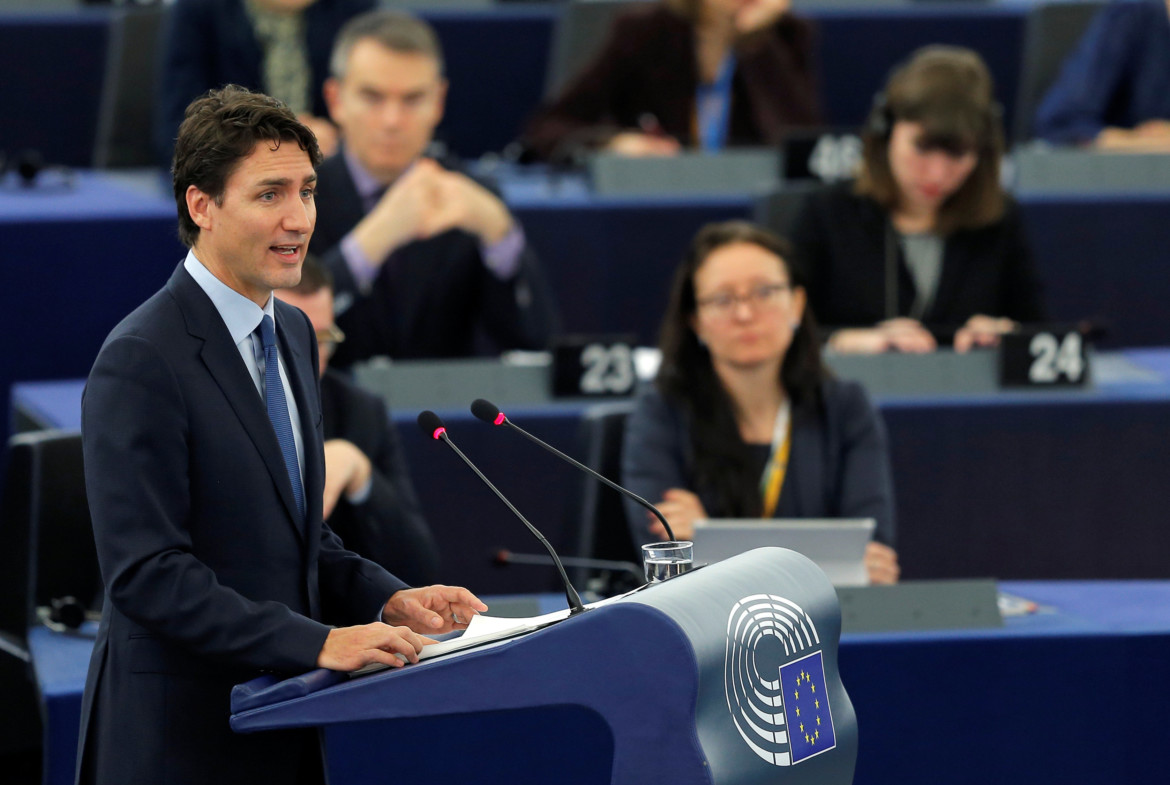
Canada’s Prime Minister Justin Trudeau adresses the European Parliament in Strasbourg, France, February 16, 2017. REUTERS/Vincent Kessler
By: Corey Martinez
Prime Minister Justin Trudeau spoke to members of the European Union Thursday in Strasbourg, France following the approval of The Comprehensive Economic and Trade Agreement (CETA).
It was the first time that a Canadian Prime Minister has addressed the European Parliament and while he had positive things to say about the EU and their trade agreement, he also had a warning.
“If we are successful, CETA will become the blueprint for all ambitious, future trade deals. If we are not, this could very well be one of the last,” Trudeau warned members of the European Parliament while delivering his speech.
Switching between English and French, Trudeau showed that he is willing to be one of the few world leaders taking on the burden of promoting inclusivity and a willingness to work with the EU.
“I believe that the relationship between Canada and the EU is so resilient because it is centered on an important bedrock of common values.We believe in democracy, transparency and the rule of law. We believe in human rights and we believe in inclusion and diversity. We know that in these times we must choose to lead the international economy, not just be subject to its whims,” Trudeau said during his speech.
Earlier this week, after three hours of debate, The Comprehensive Economic and Trade Agreement (CETA) was approved by a vote of 408-254.
CETA aims to eliminate about 98 per cent of tariffs on both sides of the Atlantic and boost Canada’s income by $12 billion dollars. European companies will be able to bid on Canadian contracts and vice versa. The EU hopes that these terms that will increase jobs as well.

French politician Yannick Jadot (L), green party EELV (Europe-Ecologie-les-Verts) candidate for the 2017 French presidential election and Member of the European Parliament sits behind a placard that reads “Yes to Canada, No to CETA” as he waits for the start of a voting session on the Comprehensive Economic Trade Agreement (CETA) between the EU and Canada, in Strasbourg, France, February 15, 2017. REUTERS/Vincent Kessler
Controversy
The agreement isn’t free of controversy however. Groups from the far left to the far right, Canadian and European, have been vocal about their distrust for a deal they say was made in secret.
Critics believe that CETA will lower the EUs environmental and food standards and give corporations more power over people, all while sharing similarities to the unpopular Transatlantic Trade and Investment Partnership (TPIP).
“CETA does not open a lot of doors for Canadian business that were not already open,” said Stuart Trew, editor of the CCPA Monitor, and contributor to Behind the Numbers, a blog that researchers and takes a left wing view on Canadian policy issues.
“Canadian exporters already have very open access to the EU’s 500 million people. And the rules in CETA are not progressive–they’re expanded versions of a typical free trade deal and go much further (in the wrong direction) on services,” he said.
In a scathing statement posted to globaljustice.co.uk by Nick Dearden, director of Global Justice Now said “It’s shameful that so many MEPs in voting for CETA have come down in favor of the army of corporate lobbyists that have been howling for this deal rather than the voices of the ordinary people that they are supposed to represent.”
“This trade deal will have terrible impacts on our public services, labor rights and consumer standards, so it is crucial that Liam Fox stops thwarting democratic process and that proper scrutiny and debate of CETA takes places for UK MPs,” he wrote.
Ratification
The ball has already started rolling on CETA, however, and the EU believes that the short term savings and advantages will erase the doubts of critics.
“The ratification in all the member states will start. That will be a long process and in most countries without any problems and in some- with more discussions,” EU Trade Commissioner, Cecilia Malmstörm told Euronews.com
“We will try to be there and try to show the effects of the Canadian agreement. Try to calm some of the concerns,” she said.

